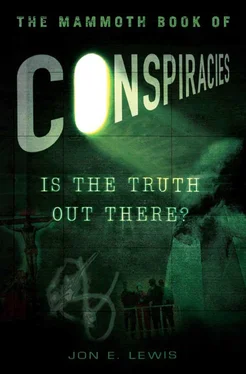Jon Lewis - The Mammoth Book of Conspiracies
Здесь есть возможность читать онлайн «Jon Lewis - The Mammoth Book of Conspiracies» весь текст электронной книги совершенно бесплатно (целиком полную версию без сокращений). В некоторых случаях можно слушать аудио, скачать через торрент в формате fb2 и присутствует краткое содержание. Город: London, Год выпуска: 2012, ISBN: 2012, Издательство: Robinson, Жанр: Прочая документальная литература, на английском языке. Описание произведения, (предисловие) а так же отзывы посетителей доступны на портале библиотеки ЛибКат.
- Название:The Mammoth Book of Conspiracies
- Автор:
- Издательство:Robinson
- Жанр:
- Год:2012
- Город:London
- ISBN:978-1-84901-363-5
- Рейтинг книги:3 / 5. Голосов: 1
-
Избранное:Добавить в избранное
- Отзывы:
-
Ваша оценка:
- 60
- 1
- 2
- 3
- 4
- 5
The Mammoth Book of Conspiracies: краткое содержание, описание и аннотация
Предлагаем к чтению аннотацию, описание, краткое содержание или предисловие (зависит от того, что написал сам автор книги «The Mammoth Book of Conspiracies»). Если вы не нашли необходимую информацию о книге — напишите в комментариях, мы постараемся отыскать её.
Jon E. Lewis is a historian and writer, whose books on history and military history are sold worldwide. He is also the editor of many
anthologies, including the best-selling
.
The Mammoth Book of Conspiracies — читать онлайн бесплатно полную книгу (весь текст) целиком
Ниже представлен текст книги, разбитый по страницам. Система сохранения места последней прочитанной страницы, позволяет с удобством читать онлайн бесплатно книгу «The Mammoth Book of Conspiracies», без необходимости каждый раз заново искать на чём Вы остановились. Поставьте закладку, и сможете в любой момент перейти на страницу, на которой закончили чтение.
Интервал:
Закладка:
The author of the most detailed report is one François Charles de Berckheim, special commissioner of police at Mayence towards the end of the Empire, who as a Freemason is naturally not disposed to prejudice against secret societies. In October 1810 he writes, however, that his attention has been drawn to the Illuminati by a pamphlet which has just fallen into his hands, namely the “Essai sur la Secte des Illuminés”, which, like many contemporaries, he attributes originally to Mirabeau. He then goes on to ask whether the sect still exists, and if so whether it is indeed “an association of frightful scoundrels who aim, as Mirabeau assures us, at the overthrow of all law and all morality, at replacing virtue by crime in every act of human life.” Further, he asks whether both sects of “Illuminés” have now combined in one and what are their present projects. Conversations with other Freemasons further increase Berckheim’s anxiety on the subject; one of the best informed observes to him: “I know a great deal, enough at any rate to be convinced that the ‘Illuminés’ have vowed the overthrow of monarchic governments and of all authority on the same basis.”
Berckheim thereupon sets out to make enquiries, with the result that he is able to state that the “Illuminés” have initiates all over Europe, that they have spared no efforts to introduce their principles into the lodges, and “to spread a doctrine subversive of all settled government… under the pretext of the regeneration of social morality and the amelioration of the lot and condition of men by means of laws founded on principles and sentiments unknown hitherto and contained only in the heads of the leaders.” “Illuminism,” he declares, “is becoming a great and formidable power, and I fear, in my conscience, that kings and peoples will have much to suffer from it unless foresight and prudence break its frightful mechanism [‘ses affreux restorts’].”
Two years later, on January 16, 1813, Berckheim writes again to the Minister of Police:
Monseigneur, they write to me from Heidelberg… that a great number of initiates into the mysteries of Illuminism are to be found there.
These gentlemen wear as a sign of recognition a gold ring on the third finger of the left hand; on the back of this ring there is a little rose, in the middle of this rose is an almost imperceptible dint; by pressing this with the point of a pin one touches a spring, by this means the two gold circles are detached. On the inside of the first of these circles is the device: “Be German as you ought to be”; on the inside of the second of these circles are engraved the words “Pro Patria”.
Subversive as the ideas of the Illuminati might be, they were therefore not subversive of German patriotism. We shall find this apparent paradox running all through the Illuminist movement to the present day.
In 1814 Berckheim drew up his great report on the secret societies of Germany, which is of so much importance in throwing a light on the workings of the modern revolutionary movement, that extracts must be given here at length. His testimony gains greater weight from the vagueness he displays on the origins of Illuminism and the role it had played before the French Revolution; it is evident, therefore, that he had not taken his ideas from Robison or Barruel—to whom he never once refers—but from information gleaned on the spot in Germany. The opening paragraphs finally refute the fallacy concerning the extinction of the sect in 1786.
The oldest and most dangerous association is that which is generally known under the denomination of the “Illuminés” and of which the foundation goes back towards the middle of the last century.
Bavaria was its cradle; it is said that it had for founders several chiefs of the Order of the Jesuits; but this opinion, advanced perhaps at random, is founded only on uncertain premises; in any case, in a short time it made rapid progress, and the Bavarian Government recognized the necessity of employing methods of repression against it and even of driving away several of the principal sectaries.
But it could not eradicate the germ of the evil. The “Illuminés” who remained in Bavaria, obliged to wrap themselves in darkness so as to escape the eye of authority, became only the more formidable: the rigorous measures of which they were the object, adorned by the title of persecution, gained them new proselytes, whilst the banished members went to carry the principles of the Association into other States.
Thus in a few years Illuminism multiplied its hotbeds all through the south of Germany, and as a consequence in Saxony, in Prussia, in Sweden, and even in Russia.
The reveries of the Pietists have long been confounded with those of the Illuminés. This error may arise from the denomination of the sect, which at first suggests the idea of a purely religious fanaticism and of mystic forms which it was obliged to take at its birth in order to conceal its principles and projects; but the Association always had a political tendency. If it still retains some mystic traits, it is in order to support itself at need by the power of religious fanaticism, and we shall see in what follows how well it knows to turn this to account.
The doctrine of Illuminism is subversive of every kind of monarchy; unlimited liberty, absolute levelling down, such is the fundamental dogma of the sect; to break the ties that bind the Sovereign to the citizen of a state, that is the object of all its efforts.
No doubt some of the principal chiefs, amongst whom are numbered men distinguished for their fortune, their birth, and the dignities with which they are invested, are not the dupes of these demagogic dreams: they hope to find in the popular emotions they stir up the means of seizing the reigns of power, or at any rate of increasing their wealth and their credit; but the crowd of adepts believe in it religiously, and, in order to reach the goal shown to them, they maintain incessantly a hostile attitude towards sovereigns.
Thus the “Illuminés” hailed with enthusiasm the ideas that prevailed in France from 1789 to 1804. Perhaps they were not foreign to the intrigues which prepared the explosions of 1789 and the following years; but if they did not take an active part in these manoeuvres, it is at least beyond doubt that they openly applauded the systems which resulted from them; that the Republican armies when they penetrated into Germany found in these sectarians auxiliaries the more dangerous for the sovereigns of the invaded states in that they inspired no distrust, and we can say with assurance that more than one general of the Republic owed a part of its success to his understanding with the “Illuminés”.
It would be a mistake if one confounded Illuminism with Freemasonry. These two associations, in spite of the points of resemblance they may possess in the mystery with which they surround themselves, in the tests that precede initiation, and in other matters of form, are absolutely distinct and have no kind of connexion with each other. The lodges of the Scottish Rite number, it is true, a few “Illuminé” amongst the Masons of the higher degrees, but these adepts are very careful not to be known as such to their brothers in Masonry or to manifest ideas that would betray their secret.
Berckheim then goes on to describe the subtle methods by which the Illuminati now maintain their existence; learning wisdom from the events of 1786, their organization is carried on invisibly, so as to defy the eye of authority:
It was thought for a long while that the association had a Grand Mastership, that is to say, a centre point from which radiated all the impulsions given to this great body, and this primary motive power was sought for successively in all the capitals of the North, in Paris and even in Rome. This error gave birth to another opinion no less fallacious: it was supposed that there existed in the principal towns lodges where initiations were made and which received directly the instructions emanating from the headquarters of the Society.
Читать дальшеИнтервал:
Закладка:
Похожие книги на «The Mammoth Book of Conspiracies»
Представляем Вашему вниманию похожие книги на «The Mammoth Book of Conspiracies» списком для выбора. Мы отобрали схожую по названию и смыслу литературу в надежде предоставить читателям больше вариантов отыскать новые, интересные, ещё непрочитанные произведения.
Обсуждение, отзывы о книге «The Mammoth Book of Conspiracies» и просто собственные мнения читателей. Оставьте ваши комментарии, напишите, что Вы думаете о произведении, его смысле или главных героях. Укажите что конкретно понравилось, а что нет, и почему Вы так считаете.











